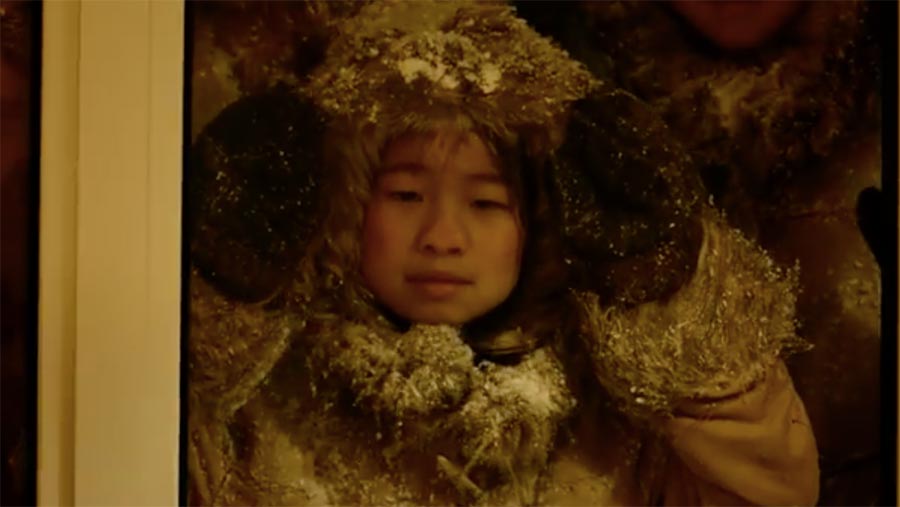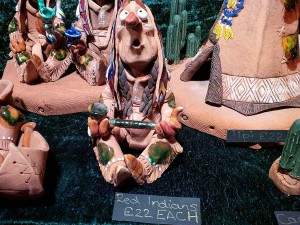This investigation contains words, images and videos which may be offensive to some readers1

Screen grab of TV advert for Domino’s Winter Survival Deal depicting “Inuit” admiring a white family eating pizza. Creative Commons Attribution-ShareAlike 4.0 International Licence
- Banks RBS and Clydesdale and car rental firm Enterprise use children in headdresses for ads
- Strathclyde Pension Fund investigates share holdings in oil developments opposed by Indigenous groups after questions raised by Tomorrow
- Government agency Education Scotland celebrates claiming of Canadian land and Scots who founded more than a century of genocidal policies
- Catalogue giant Argos and Exeter Chiefs rugby team also examined in exclusive Tomorrow investigation
Food giant Domino’s has apologised for causing any offence with a “light-hearted” TV ad depicting Inuit licking their lips as they watch a white family eat pizza.
The commercial is one of several examples in the United Kingdom where Indigenous culture is used to sell products or services.
A lengthy investigation by Tomorrow examined adverts from major banks, items sold at small markets or through catalogue stores, and government-promoted education about colonialism.
And questions from this probe have led to one of the UK’s biggest public pension funds to investigate more than $3 million invested through mutual holdings towards a firm connected to the Standing Rock fight in North Dakota.
SELECT THE LINK BELOW TO READ PART 1 OF OUR INVESTIGATION
Banks RBS and Clydesdale and car rental firm Enterprise all use children dressed with feathered headdresses while an upmarket home furnishing company has a luxury brand of “teepee wallpaper”.
While Washington DC’s American football team has had its trademark revoked for being racist, the team won new approval for the UK and across Europe.
And rugby team the Exeter Chiefs have seen their annual turnover increase from more than £19,000 to more than £13 million since changing their name to make use of Indigenous imagery.
Indigenous peoples on both sides of the Atlantic interviewed by Tomorrow agreed Britons should educate themselves but would find it easy to buy the products and services on offer without accepting the modern reality as a direct result of colonialism.

Figurines on sale at the German Christmas Market in 2015 in Glasgow, UK. Similar figures are on sale in 2016. Creative Commons Attribution-ShareAlike 4.0 International Licence
Artist Shelley Niro told Tomorrow: “It is about ownership and possessiveness and making it okay to play with kind of imagery. In the end, it’s really racism.”
Author and activist Brandon Pardy said Inuit might eat traditional food, but also eat Domino’s, tacos and oranges.
“It’s fine if someone makes fun of themselves, but Inuit aren’t in deerskins only having hard winters sitting around chewing the fat – that’s not all we are,” he said. “And if you lock us in history like that, then it diminishes the fact that we have doctors and lawyers and somebody that’s just finished open heart surgery on you might be Inuk and they might want to go home and eat some Domino’s because they’ve had a really hard day.”
Domino’s did not answer questions about who made their “Winter Survival Deal”, which was cleared by the Advertising Standards Authority as “factual”. They also would not answer suggestions by Mr Pardy or even accusations under the video on YouTube that the actors are not actually Inuit.
Louise Butler, brand and digital communications manager, said in an email statement: “Our winter advert intended to be light-hearted in humour and so we would like to apologise if this has caused any unintentional offence.
“We undertake substantial advance consumer research and go through a strict regulatory approval process for all our adverts and at no point was this raised as a concern. Domino’s will also be using a fresh creative for its adverts this winter onwards.”
In almost all examples examined by Tomorrow, children are the target for the products or are used in commercials “playing”.
Activist and author of Indigenous Writes, Chelsea Vowel, said: “At this point what I have to do now is convince people that we’re human, that we’re worthy of respect,” she said. “And that’s always a weak position when you have to convince other people of your humanity. And that’s what we’re often forced to do, and I really resent that.
“Why should British people care? Well, they don’t have to care because they have all the power to not care.”
“You can’t just take the fun bits and leave out the all the awful things that happened because those awful things that happened are still having an impact on our health and our education, our access to water, our access to human rights.”
[Tweet “”What I have to do now is convince people that we’re human, that we’re worthy of respect””]
Strathclyde Pension Fund, which is involved in funds with shares in major US pipelines opposed by Indigenous peoples, told Tomorrow: “These particular stocks are not direct investments by the fund, but are held passively through an index tracking portfolio – which does limit the influence the fund has, in comparison to direct investments.
“However, the fund notes the concerns raised and is currently seeking further information from the portfolio manager and its responsible investment advisors.”
As well as headdresses, figurines and t-shirts depicting Indigenous peoples easily found on sale, Indigenous peoples are also mocked in education and training settings or the colonial claiming of the land celebrated.
Scotland’s education department website promotes the wealth of places within Canadian borders named by or for Scotland. A group of teachers in Exeter celebrate their rugby team, the Chiefs, with a drum chant, mirroring that for the Atlanta Braves, long derided by campaigners in the US.
And far-right and anti-immigrant political groups in the UK and Europe continue to make use of Indigenous history to manipulate their own arguments for racial purity across the continent – something with a long history in propaganda and popular entertainment, particularly in Germany.
“I hate that we have these images that are just a complete joke,” said youth activist RJ Jones. “People are not taking us seriously because of these images. Or they’ll take our images but they don’t want to take the suffering that comes with it.”
SELECT THE LINK BELOW TO READ PART 1 OF OUR INVESTIGATION
- Tomorrow has chosen to use all words, team names, logos and items without restriction. This is not done casually but under our duty to educate, it is impossible to educate readers ignorant to what is offensive without clearly indicating what is considered offensive by others. Similarly, under our core principle to comfort the afflicted and afflict the complacent, if words, images or actions of the complacent are afflicting others, then that must be highlighted and challenged. ↩


